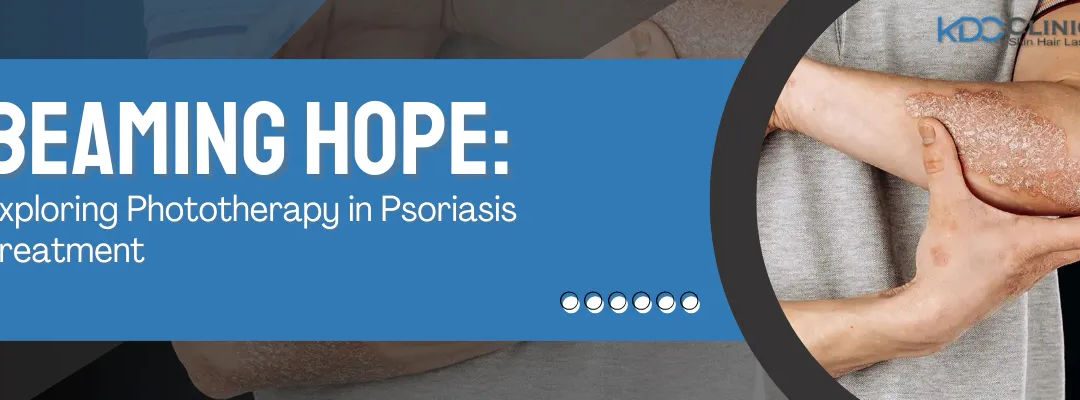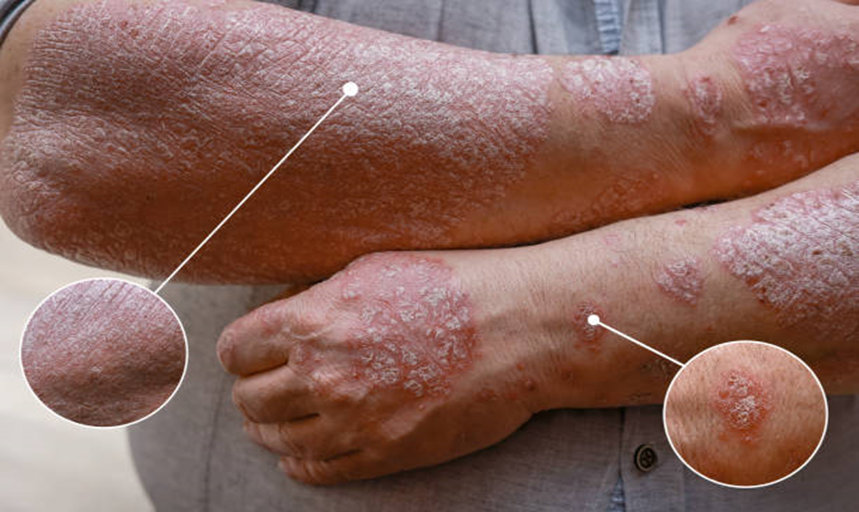
Are you seeking a reliable solution to relieve the persistent challenges of psoriasis? Phototherapy in psoriasis can help in the effective management of psoriasis symptoms.
At KDC Skin Clinic, Dr. Archit Aggarwal, often considered the best dermatologist in Faridabad, offers safe and result-oriented phototherapy for psoriasis treatment. It is a cutting-edge approach designed to relieve and restore your skin’s natural health.
In this blog, we delve into the nuances of phototherapy in psoriasis. We will also discuss its efficacy and benefits.
But how does light make such a significant impact on psoriasis? Let’s unravel the science behind it.
What is Phototherapy, and How Does It Help in Psoriasis?
Phototherapy, often called light therapy, is a non-invasive dermatological treatment. It employs ultraviolet (UV) light to ease the symptoms of psoriasis. This therapeutic approach offers a natural and effective alternative for psoriasis care.
Exposure to UVB or UVA light during phototherapy slows down the excessive growth of skin cells, a characteristic of psoriasis. It also helps reduce inflammation and promotes skin healing.
Research indicates routine phototherapy sessions can improve symptoms in 70-90% of psoriasis patients. Phototherapy’s success depends on consistency and adherence to the prescribed treatment plan. By harnessing the power of UV light for psoriasis, phototherapy reduces the visible symptoms. It also enhances skin health.
But how do you know which phototherapy type suits you best? Let’s explore.
Types of Phototherapy Used for Psoriasis
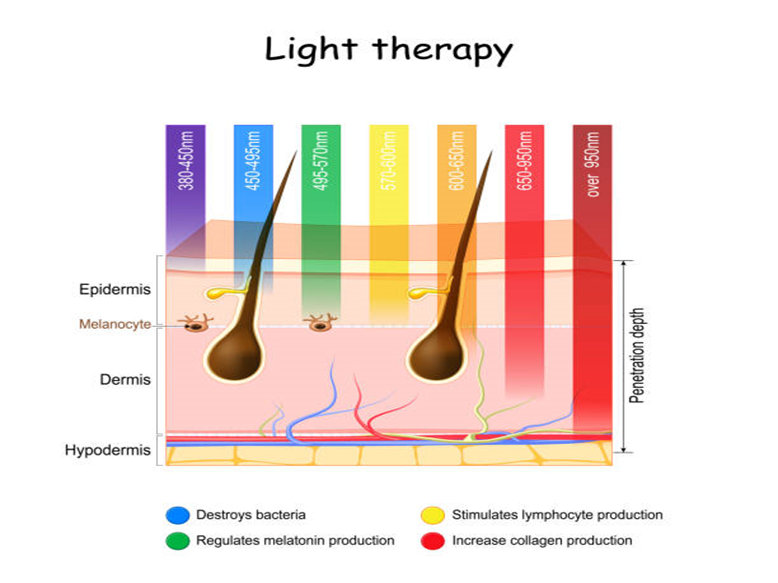
Phototherapy, often called light therapy, is a non-invasive dermatological treatment. It employs ultraviolet (UV) light to ease the symptoms of psoriasis. This therapeutic approach offers a natural and effective alternative for psoriasis care.
Exposure to UVB or UVA light during phototherapy slows down the excessive growth of skin cells, a characteristic of psoriasis. It also helps reduce inflammation and promotes skin healing.
Research indicates routine phototherapy sessions can improve symptoms in 70-90% of psoriasis patients. Phototherapy’s success depends on consistency and adherence to the prescribed treatment plan. By harnessing the power of UV light for psoriasis, phototherapy reduces the visible symptoms. It also enhances skin health.
But how do you know which phototherapy type suits you best? Let’s explore.
Types of Phototherapy Used for Psoriasis
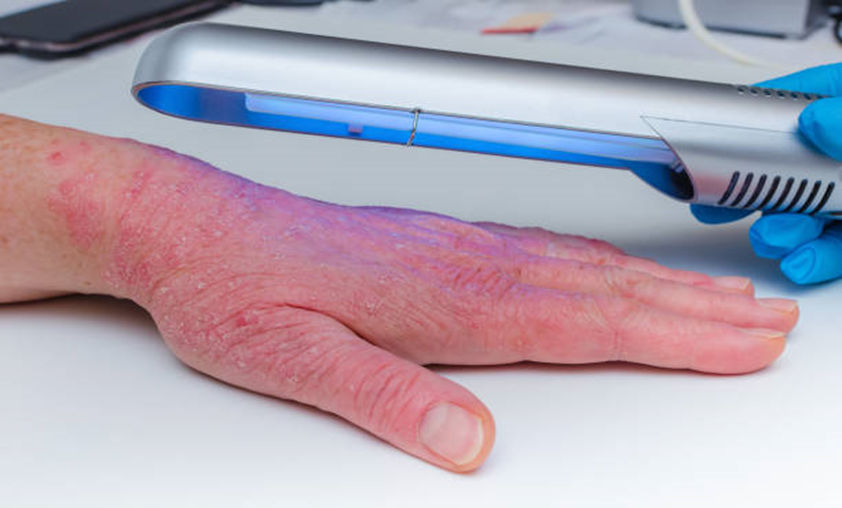
When it comes to managing psoriasis, phototherapy emerges as a powerful ally. Dr. Archit Aggarwal, a seasoned skin specialist in Faridabad, offers various types of phototherapies for the effective management of psoriasis:
1. UVB Phototherapy:
- Ultraviolet B (UVB) phototherapy is the most preferred treatment.
- It delivers optimal results for psoriasis patients.
- UVB light therapy for psoriasis involves exposure to UVB rays.
- It slows down the excessive proliferation of inflammatory and skin cells characteristic of psoriasis.
2. PUVA Therapy:
- PUVA therapy stands for Psoralen plus UVA.
- It combines a light-sensitizing medication (Psoralen) with UVA light exposure.
- This dual-action approach helps curb the overactive skin cell production in psoriasis patients.
3. Narrowband UVB Therapy:
- Narrowband UVB light for psoriasis treatment refines the UVB wavelength.
- This makes it a targeted and potent option for psoriasis treatment.
4. Excimer Laser Therapy:
- Excimer laser therapy targets affected skin areas.
- It delivers concentrated UVB light for focused treatment.
Remember, the choice of phototherapy depends on various factors. These include:
- psoriasis severity
- patient’s medical history
- individual response to treatment
Consult a qualified dermatologist like Dr. Archit Aggarwal to determine the most suitable phototherapy approach for you.
How is PUVA Therapy Different in Treating Psoriasis?
Let’s see
PUVA therapy stands out from conventional psoriasis treatments for the following reasons:
1. Targeted Wavelengths:
- PUVA therapy employs UVA light in the 320-400 nanometre range.
- UVA penetrates deeper into the skin. It reaches the psoriasis-affected cells.
2. Psoralen Sensitization:
- Psoralen, a light-sensitizing medication, is administered before UVA exposure.
- Psoralen enhances skin responsiveness to UVA. It maximises therapeutic benefits.
3. Flexible Administration:
- PUVA can be administered orally (as psoralen pills) or topically (as a bath or cream).
- Versatility in administration allows for personalized treatment plans.
4. Localized Treatment:
- PUVA is effective for localized psoriasis or widespread cases.
- Dermatologists can target specific areas or address comprehensive skin involvement.
5. Combined Approach:
- PUVA can be used in conjunction with other psoriasis treatments.
- Combination therapy enhances efficacy. It provides a multifaceted approach to management.
6. Varied Treatment Frequencies:
- Treatment frequency varies based on individual response and severity.
- Dermatologists tailor PUVA sessions to optimize outcomes while minimizing risks.
7. Long-Term Maintenance:
- PUVA may need ongoing maintenance sessions for sustained results.
- Dermatologists collaborate with patients to establish manageable long-term plans.
8. Minimal Downtime:
- In comparison to PUVA; NBUVB offers minimal recovery time.
- Patients can resume routine activities soon after each session.
9. Consideration of Patient Factors:
- Dermatologists consider patient characteristics such as skin type and medical history.
- Personalized considerations enhance PUVA’s effectiveness while minimizing risks.
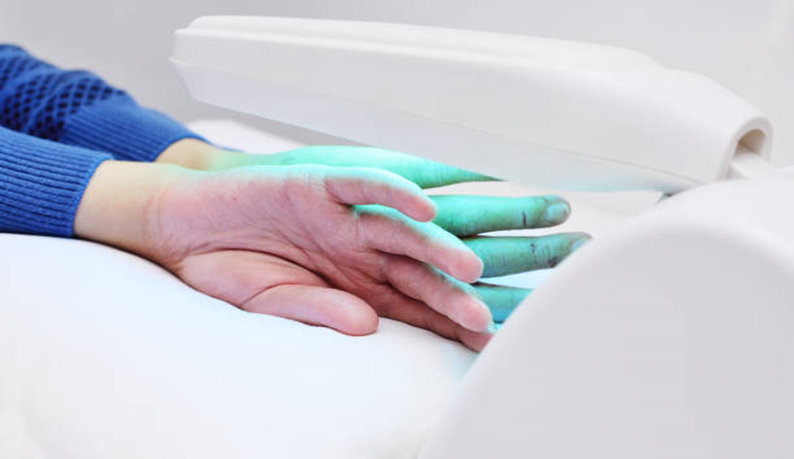
Discover the transformative power of Phototherapy in Psoriasis care. Connect with Dr. Archit Aggarwal to explore tailored solutions and unlock the potential for clearer, healthier skin.
Curious about the effectiveness of phototherapy? Let’s unravel the rapid relief, targeted treatment, and consistent improvement it offers.
Effectiveness of Phototherapy in Psoriasis Treatment
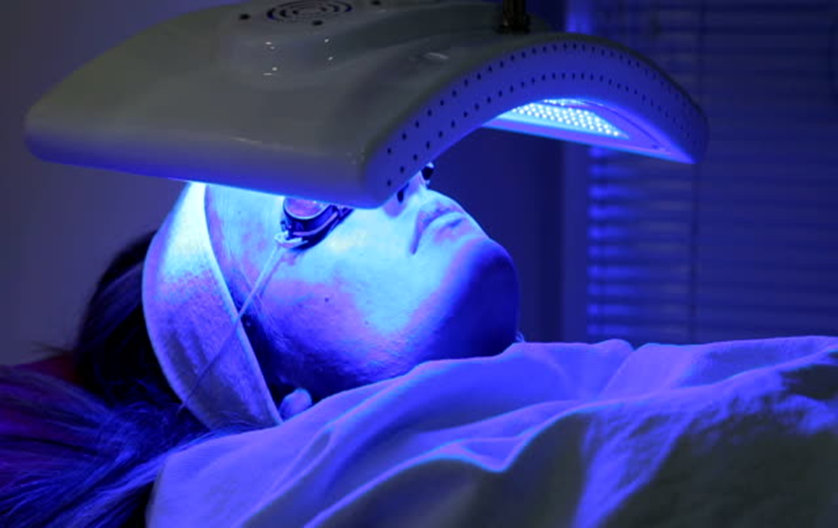
- Rapid Symptomatic Relief: Phototherapy emerges as a quick, effective solution for alleviating the psoriasis symptoms. Patients often witness a notable reduction in redness, itching, and scaling.
- Targeted Treatment Approach: Unlike some conventional treatments, phototherapy precisely targets affected areas, promoting focused healing. This targeted approach minimizes potential side effects and enhances treatment efficacy.
- Versatility Across Psoriasis Types: Phototherapy showcases versatility, proving beneficial across various types of psoriasis. These include plaque, guttate, and inverse psoriasis. This adaptability makes it a viable option for a broad spectrum of patients.
- Consistent Improvement Over Time: Regular sessions of phototherapy lead to consistent and gradual improvement in psoriatic lesions. The treatment’s cumulative effect contributes to sustained relief. It also enhances skin appearance throughout treatment.
- Reduced Dependency on Topical Treatments: Patients often need less topical treatments as phototherapy takes centre stage. This shift simplifies the treatment regimen and minimizes reliance on certain medications.
- Longer Remission Periods: Phototherapy has demonstrated its ability to extend remission periods. It offers patients a welcome break from active psoriasis symptoms. This enhances the quality of life for those managing chronic psoriasis.
- Well-Tolerated Treatment Option: Often well-tolerated, phototherapy poses fewer systemic side effects than some systemic psoriasis treatments. This makes it a preferable choice for those seeking effective results with minimized disruptions to daily life.
- Positive Impact on Mental Well-Being: Besides physical benefits, phototherapy influences patients’ mental well-being. It addresses the visible aspects of psoriasis. Improved skin appearance often correlates with boosted self-esteem and a more positive outlook.
Phototherapy is a potent, versatile, and well-tolerated treatment option for managing psoriasis. Its efficacy and positive impact on patients’ lives make it a valuable therapeutic tool.
Now, you might be wondering about the financial aspect. Let’s shed light on the phototherapy for psoriasis cost.
How Much Does Phototherapy for Psoriasis Cost?
The approximate cost of phototherapy for psoriasis per session ranges from INR 800 to INR 1,500 or more. However, the expense may vary based on various factors. These include:
- the doctor’s expertise
- the clinic’s location
- the specific type of phototherapy employed
- the number of sessions recommended
For exact cost estimates and personalized care, consult a reliable dermatologist in Faridabad. It will help patients understand the financial aspect. It also ensures a holistic approach to their psoriasis management journey.
Concerned about safety? Let’s address the common side effects and safety measures.
Phototherapy for Psoriasis Side Effects and Safety
- Phototherapy in psoriasis is often safe and well-tolerated.
- Common side effects are often mild and temporary.
- Short-term side effects include redness, itching, and dryness.
- Long-term risks may involve an increased risk of skin ageing and potential eye damage.
- Protective measures like goggles are advised during treatment to minimize eye risks.
- Consultation with a dermatologist ensures personalized safety considerations.
- The risk of skin cancer is minimal, especially when treatment guidelines are followed.
- Regular follow-ups are crucial to track and address any emerging concerns earlier.
Phototherapy in psoriasis, under the guidance of a skilled dermatologist like Dr. Archit Aggarwal, is often safe and well-tolerated. Open communication about any concerns or observed side effects ensures a tailored and secure treatment experience.
Ready to take charge of your phototherapy journey?
Let’s discuss,
Precautions and Considerations for Patients
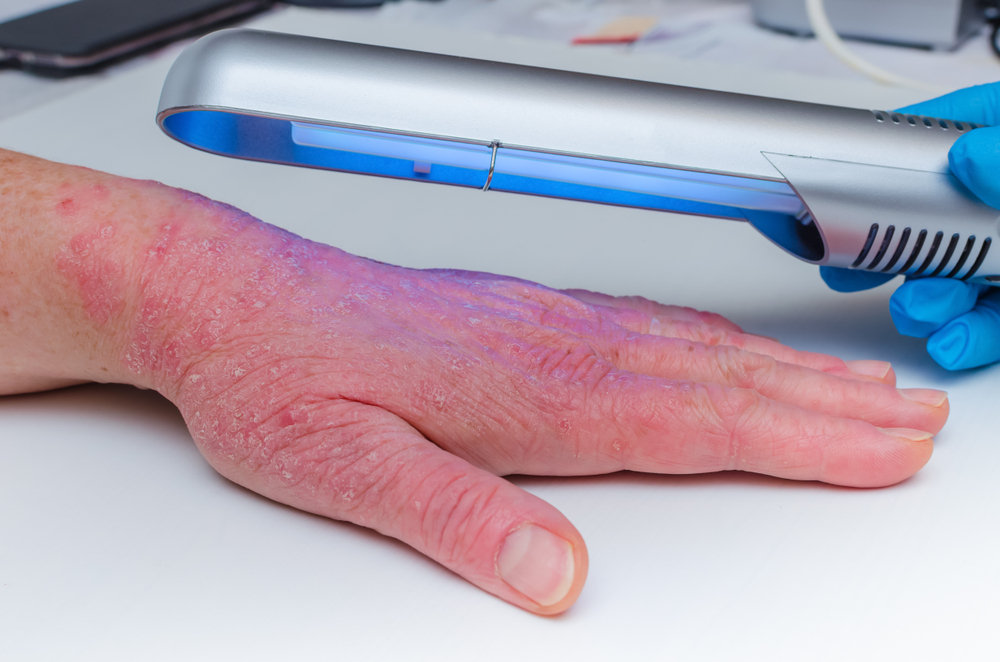
1. Sunscreen Vigilance:
- Always apply a broad-spectrum sunscreen before each session.
- Opt for a sunscreen with at least SPF 30, ensuring comprehensive UV protection.
2. Eye Protection Essentials:
- Wear protective eyewear to shield the eyes from UV rays during phototherapy.
- Consult with the healthcare provider to choose suitable eye protection.
3. Skin Sensitivity Awareness:
- Report any unusual skin reactions promptly to the healthcare team.
- Inform the medical staff of any pre-existing skin conditions or allergies.
4. Consistent Treatment Schedule:
- Adhere to the prescribed treatment schedule without gaps for optimal results.
- Inform the doctor if any session needs change or rescheduling.
5. Clothing Choices Matter:
- Wear loose, comfortable clothing to avoid friction and irritation.
- Avoid tight-fitting fabrics that may exacerbate skin sensitivity.
6. Hydration is Key:
- Maintain adequate hydration levels before and after each phototherapy session.
- Well-hydrated skin responds better to treatment and minimizes potential side effects.
7. Temperature Awareness:
- Be mindful of overheating during phototherapy, especially in warmer weather.
- Report any signs of excessive heat or discomfort during sessions.
8. Medication Communication:
- Inform the doctor about all medications, including OTC drugs.
- Adjustments may be necessary to prevent potential interactions during phototherapy.
9. Pregnancy and Nursing Considerations:
- For female patients, communicate pregnancy or nursing status to the healthcare team.
- Phototherapy adjustments may be required to ensure safety for both mother and child.
10. Follow-Up Consultations:
- Attend all scheduled follow-up appointments to assess treatment progress.
- Discuss any concerns or changes in health with the healthcare provider promptly.
11. Educational Empowerment:
- Stay informed about the treatment process and potential side effects.
- A well-informed patient contributes to a successful phototherapy journey.
These precautions are vital for optimizing the effects of phototherapy and ensuring patient safety. Consult healthcare providers for personalized guidance based on individual health conditions and needs.
Home or clinical Phototherapy? Let’s weigh the factors and find the perfect fit for you.
Home Vs. Clinical Phototherapy Treatments
Choosing between home and clinical phototherapy depends on several factors. These include individual preferences, severity of psoriasis, and lifestyle constraints. Both options have their merits and limitations. Consulting an expert like Dr. Archit Aggarwal, a renowned dermatologist in Faridabad, can help individuals tailor their treatment plans for maximum effectiveness.
| Factors | Home Phototherapy | Clinical Phototherapy |
|---|---|---|
| 1. Cost Considerations | Often more cost-effective initially. | Initial setup costs may be higher, but insurance coverage is often available. |
| 2. Equipment Accessibility | Convenient for daily use. But requires a dedicated space for the light setup. | Access to specialized equipment under professional supervision. |
| 3. Treatment Frequency | Offers flexibility for daily treatments. But consistency is crucial. | Often scheduled 2-3 times a week, allowing for monitored progress. |
| 4. Safety Measures | Requires strict adherence to safety guidelines to prevent adverse effects. | Constant supervision ensures optimal safety and minimizes risks. |
| 5. Severity of Psoriasis | Suitable for mild to moderate cases, ongoing monitoring is vital. | Effective for various psoriasis severities, with the ability to adjust the intensity as needed. |
| 6. Time Commitment | Saves travel time. This makes it more convenient for those with busy schedules. | Treatment sessions may take longer due to commuting, clinic protocols, and waiting times. |
| 7. Monitoring and Adjustments | Patients need to stay vigilant and communicate with their healthcare providers. | Dermatologists can track progress, making real-time adjustments for optimal results. |
| 8. Lifestyle Factors | Requires self-discipline and commitment to treatment routines. | Offers a structured approach with professional guidance. It is suitable for individuals needing external motivation. |
Conclusion
Phototherapy offers hope to those dealing with psoriasis challenges. The journey towards clearer, healthier skin is not a solitary one. When you have a skilled dermatologist like Dr. Archit Aggarwal leading the way and the science of phototherapy lighting up the path, effective management of psoriasis is possible.
Seize the opportunity to discuss personalized Phototherapy options with the best dermatologist in Faridabad. Your path to radiant skin starts with a simple click or call.
Still have questions? Let’s address some FAQs:
1. How does phototherapy work for psoriasis?
Phototherapy exposes your skin to ultraviolet (UV) light. It slows down the rapid cell growth associated with psoriasis. It helps relieve symptoms and promotes skin healing.
2. What is the success rate of phototherapy for psoriasis?
Phototherapy has shown significant success in managing psoriasis. Many patients experience notable improvements in skin texture and a reduction in flare-ups. Success rates vary, but it is a well-established and effective treatment option.
3. How long is light therapy for psoriasis?
The duration of light therapy for psoriasis depends on several factors. These include the type of phototherapy used and the severity of your condition. Sessions often last a few to 30 minutes. Your dermatologist will craft a personalized treatment plan.
4. How soon can I expect results with phototherapy in psoriasis?
Results vary, but many patients experience significant improvement after a few weeks of regular sessions. Consistency is critical. Dr. Archit Aggarwal will guide you on the expected timeline based on your response.
5. Are there age restrictions for phototherapy in psoriasis treatment?
Phototherapy is a versatile treatment suitable for various age groups. However, specific factors, such as a child’s age, may influence the treatment approach. Dr. Archit Aggarwal will assess individual cases and tailor the treatment accordingly.
Reference links:

